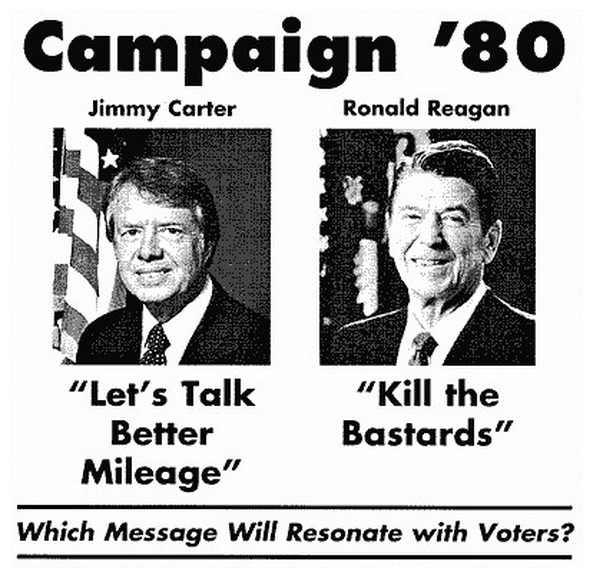For as difficult as performing any kind of digital preservation can be, advocating for it can be even harder still. To do so constructively often requires the rhetorical tact and precision of a seasoned politician: make clear the stakes, overwhelm your audience with carefully chosen statistics, and finally wrench their hearts with the story of the little old lady from Kansas who can’t see the photos she took of her grandkids two software upgrades ago. As in politics, however, the sausage-making of digital preservation work is as nuanced and technical as its public face is all-too-often overly simplistic, when not downright apocalyptic.

The Onion
Warning their unsuspecting publics of an impending “digital dark age,” news outlets from the BBC to The Independent to NPR reverberated those apocalyptic tones in the past week with verve unheard since the last time they did it. Actually, things may be getting worse: whereas the 2003 model tech writer for Britain’s The Guardian saw ample cause for hope among digital library infrastructure projects, today’s has learned to stop worrying and love obsolescence.
Why do we keep this stuff? Doesn’t it just pull us into the past?
Nominally at issue this time is internet pioneer and Google exec Vint Cerf’s assertion that without a “digital vellum” analogous to the millennia-old medium to hold it, future generations will lack any meaningful record of our own. He’s not wrong. In fact, if you watch the video of his actual speech, you’ll notice that his observations on digital preservation are fairly modest and plain; he merely introduces computer scientists to the basic concept of describing hardware and software environments such that they may be emulated in the future with the least significant loss. Rather than cataclysmic, he most often characterizes that problem as “hard.”
The only part of Cerf’s address that scared me was its complete omission of the defining digital preservation work done and continuing to flourish among national libraries, archives, non-profit memory institutions, and yes, even a few private sector partners. Librarians in general are mentioned only in a passing anecdote and as some kind of rabble of unruly schoolchildren; the Internet Archive is a quixotic novelty. This is especially disappointing because Cerf clearly knows better. “Cerf was a keynote speaker and a very attentive attendee at the UNESCO Conference on Digital Preservation in Vancouver in 2012,” UBC Professor and InterPARES project lead Luciana Duranti–no polemicist, rather an actual pioneer in the dutiful advancement of digital forensics–recounted in an email among archivists this week. “He knows.”
‘You’re not helping,’ is the chorus I heard among digital preservationists on social media in the last week, but let’s respect that Cerf is an unparalleled voice of authority among critically important stakeholders, and that he’s using that position at this moment to articulate the values and potential of our work. Our responsibility, in the meantime, is to articulate and pursue the solutions. “As an archivist, I am abashed that many of my colleagues would fly off the handle based on reports in the popular press,” added Ken Thibodeau, a long-time leader of digital preservation initiatives spanning important NARA, NIST, and Object Management Group projects, added to the discussion above. “I for one am happy that someone of the stature, the intelligence, the profound expertise in IT, and the graciousness of Vint Cerf is publicizing our case.”
We understand that digital preservation is a human and a policy challenge, not a sprint coding assignment. That’s not quite as catchy as “everything you ever loved will die,” so let’s talk digital preservation and see if we can’t come up with a more hopeful message–one that articulates the needs and assuages the fears of the increasingly broad and diverse communities that deserve stewardship. They will remember it longer than The Guardian will remember their own copy, and well after Google fades from the challenge.
For an alternative narrative, consider the comparatively constructive style and hopeful message of The New Yorker’s January foray into the specific challenge of web archiving: “The Cobweb.” This piece by the Harvard-based historian Jill Lepore hits the political high notes: the prodigious dreamer who strikes out on his own, hands clasped across America to achieve his vision, some casual marginalization of the French, and even a stalwart fight against change waged from inside a church! Unlike media coverage in the intervening weeks, however, it seeks explanation of the stakes, the specific obstacles, and a vision of the future, from among a wonderfully comprehensive collection of information scientists and professionals. The reader is left with an appropriately cool-headed impression of the problems (they’re all very hard) and a confidence-boosting appraisal of the fights ahead (they all have their champions).
Save yourself innumerable family conversations explaining your #webarchiving job by sending them this NYer article: http://t.co/w0QOZkEFSo
— Jefferson Bailey (@jefferson_bail) January 20, 2015
So at the risk of possibly boring friends and family with our unrepentant level-headedness, let’s continue to talk about digital preservation in constructive terms and tones. We already walk the walk, so why not talk the talk? Let’s offer our alternative vision to the doomsday preppers online, and not just amongst ourselves; let’s advocate our productivity to resource allocators in public, academic, and institutional libraries; maybe let’s send our Q*bert high scores to The Guardian.

